Venezuela's policy recommendations for an upcoming showdown
LI,JIN WEI
20190503
Venezuela in brief
The full name of Venezuela is the Bolivarian Republic of Venezuela, or Venezuela for short. It is a country located in the northern part of South America and its capital is Caracas. It borders the Caribbean Sea to the north, Colombia to the west, Brazil to the south, and Guyana to the east. It is called the "town of waterfalls" and covers an area of 916,000 square kilometers.
Venezuela’s country name “Venezuela” actually comes from the meaning of “Little Venice” in Italy, and its allusion comes from the Italian explorer Amerigo Vespucci (Amerigo Vespucci) who first saw the American Indians on Lake Maracaibo. The village of stilt houses on the water where the Anren lives is named after the water capital of Europe, Venice. As for the "Bolivar" in the official country name of Venezuela, it was added when Venezuela renewed its constitution in 1999 to commemorate Simon Bolivar, who was regarded as the founding hero.
Venezuela was originally the place where Indians lived. Columbus came here when he sailed to America in 1498. The Spanish established the first colony in 1523. It became a Spanish colony in 1567. Independence on July 5, 1811. The Federal Republic of Venezuela was established in 1830, and in 1864 it was renamed the United States of Venezuela. In December 1999, it was changed to the current country name. It established diplomatic relations with China on June 28, 1974.
Venezuela is a member of the Association of South American Nations and the Organization of Petroleum Exporting Countries, as well as an important oil producer and exporter in the world. One of the world's major oil producing countries. The oil industry is the lifeblood of its economy, and this income accounts for about 80% of Venezuela’s export revenue.
The shadow of the great power wrestling in chaos
Venezuelan President Maduro declared in his latest televised speech that he has defeated the "attempted coup" planned by opposition leader Guaido.
It is reported that at least dozens of National Guard soldiers have joined the ranks of the opposition. At least 100 people were injured in the street clashes that began on Tuesday (April 30) local time.
At the same time, the opposition leader Guaido continued to insist that the army no longer obeys Maduro's command and that the current regime has lost control of the situation. He also called on people to continue to take to the streets to protest.
The fight between the United States and Russia
The latest developments in Venezuela are the result of the struggle between the United States and Russia behind the scenes, and from the perspective of the situation, Russia may have the upper hand.
After the incident, the US Secretary of State Pompio quickly accused Russia of interfering in Venezuelan affairs and said that the United States had persuaded Maduro to prepare to go into exile in Cuba.
Russia has huge investments and interests in the Venezuelan oil industry, so it is an indisputable fact that it has supported the current government for a long time, and the United States and its allies have also very openly sided with the opposition leader Guaido.
Venezuelan opposition leader Guaido called for an army uprising on April 30, describing it as the "final stage" of ending Maduro's rule. A large number of demonstrators responded to the call and took to the streets of Caracas to clashed with security guards. The demonstrators threw stones and other sundries at the security guards and hit the police defense line. The guards fired tear gas and responded with rubber bullets and water cannons. This was the most violent scene in the police-civilian conflict since Venezuela's political situation deteriorated.
But for the time being, there is no sign that Guaido has the full support of the military. Venezuelan President Maduro refused to step down, claiming victory from this attempted coup, indicated that it will pursue in the end; Defense Minister Vladimir military base in Seoul led ‧ Padrino (Vladimir Padrino) also expressed support for Maduro.
U.S. officials claimed that the three members of Maduro’s presidential circle had promised the opposition that Maduro “must leave”, but later retorted.
Brazil, which supports Guaido, said that at least 25 Venezuelan soldiers have sought asylum in Brazil's embassy. Guaido called for support for the people to continue to fight in the streets on Wednesday, and Maduro also called on supporters to take to the streets to oppose the coup.
Military coup?
The opposition leader Guaido, who was recognized as the transitional president by 50 countries including the United States, published a three-minute video in the early morning of April 30, claiming to have received the support of "brave soldiers" and referring to the national army's promise that "will Stand on the right side of history". The outside world surprise, he appeared beside another opposition leader Leopoldo ‧ Lopez (Leopolodo Lopez). Lopez was accused of inciting violence after an anti-government demonstration in 2014, and is currently under house arrest by the authorities. Lopez said he was released by members of the military. But then he went to the Chilean Embassy to seek asylum and then transferred to the Spanish Embassy. This raises questions about who released Lopez and how strong the military opposition is.
However, most of the military's high-level officials are ostensibly loyal to President Maduro.
President Maduro made a televised speech that evening, saying that the opposition’s goal was just “a show” and that the military members who supported Jaido were only a “few”, and their plans and calls were “failure”, “because Venezuela wanted to Want peace."
He stated that he would pursue this "coup" and has appointed three prosecutors to conduct "criminal prosecutions", believing that this is unconstitutional and illegal, and "it is impossible not to be punished."
Venezuelan Defense Minister Padrino and Maduro delivered a speech together. He said that he had defeated a small number of members of the military who participated in the "uprising." He also warned that there will be bloodshed if it continues, and emphasized that the country has prepared "weapons" to defend the sovereignty and independence of the sovereign.
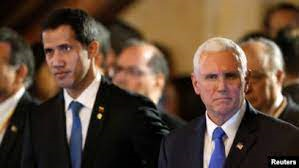
On February 25, 2019, the Vice President of the United States met with Venezuelan opposition leader Iguado
Guaido's biggest bet
Bolton said the United States National Security Advisor, Venezuelan Defense Minister Padrino, Supreme Court Chief Justice Michael ‧ Moreno (Maikel Moreno) and presidential bodyguard Ivan ‧ Herman Hernandez ‧ Dallas (Ivan Rafael Hermandez Dala) has been working with the opposition Communication, they originally agreed to the opposition's request to support Maduro's resignation, but later they did not do so. Padrino publicly expressed allegiance to Maduro shortly after Guaido announced the uprising.
US Secretary of State Pompeo stated that Maduro would leave Venezuela for Cuba on April 30, but Russia asked him to stay. Pompeo did not provide evidence in this regard. Maduro described this as a "joke." Venezuelan officials said that this is a "propaganda" strategy of the United States.
The White House declined to say whether it knew Guaidó’s plan beforehand, but Guaído’s various personnel revealed that the Trump administration did not assist in the April 30 incident, which was a spontaneous movement by Venezuelans. This is certainly not recognized by the Maduro government. Venezuelan Foreign Minister Jorge Arreaza believes that the United States is behind it.
This "uprising" is Guaido's big bet, and there is not enough evidence to prove that there is a large number of army apostasy. If Guaido fails this time, it will show that he does not have enough support, and the authorities may cancel his parliamentary immunity and investigate and arrest him.
U.S. President Trump stated that he stood on the side of the Venezuelan people and warned that a "comprehensive embargo" and "highest-level sanctions" would be imposed on Cuba, which supports Maduro.
The US Federal Aviation Administration has ordered all aircraft in Venezuela to leave within 48 hours and prohibits US aircraft from flying in Venezuelan airspace below 26,000 feet because of "political tension and instability."
UN Secretary-General Guterres called on both sides to avoid violence. Western countries, Colombia and Brazil respectively supported Jaido and called for the army to rebel.
The Russian Ministry of Foreign Affairs accused the Venezuelan opposition of moving toward violence and wanting to involve the military in the conflict. Bolivia, Cuba, Turkey, etc. all condemnedBlame Guaido.
Maduro declares victory
US and Russian foreign ministers plan to meet next week to discuss the situation in Venezuela
Wei Neirui La incumbent President Maduro said the army has foiled a coup multi-Guay, the reign of the Venezuelan President Maduro 5 Yue 1 televised speech, accompanied by military officers and intelligence officers, declare " loyalty and obedience, "the armed forces to work defeated himself interim president Guay multi coup.
Call for support in GuaidoAfter the holders made their last fight to overthrow Maduro, on May 2 the opposition leader called for a general strike across the country to demonstrate his strength against Maduro.
In an interview with Deutsche Welle on May 1, Guaido said, “The army no longer supports Maduro.” However, although there were a few mutineers in the army, there was no large-scale defection. At the same time, the National Guard used tear gas, and most of the protests in the capital Caracas were dispersed.
Both Maduro and Guaidó held a rally in Caracas that day, and the two accused each other of launching a coup.
Maduro said Guaido’s actions “will not go unpunished”. Guaidó warned: "The Maduro regime is trying to step up repression, trying to persecute me, and launching a coup."
Maduro also posted a series of patriotic tweets, including photos of supporters and former President Chavez.
Maduro praised the amendment to the constitution in one of the tweets: "Two years have passed since the blessed day. At that time, we gathered the unalterable original power from the Venezuelan people to elect a national representative who plenipotentiated the people. Come to the General Assembly to achieve peace and tranquility. Long live the power of voters!"
US and Russian foreign ministers plan to meet next week to continue discussing the situation in Venezuela
A senior US government official revealed that Secretary of State Pompeo plans to meet with Russian Foreign Minister Lavrov next week to further discuss the conflicts between China and Russia in the Venezuelan situation and the Ukraine situation.
The two will go to Finland on May 6th and 7th to attend the meeting of the foreign ministers of the eight member states of the Arctic Council, and they will continue their discussions on the Venezuelan issue without any results. They had just spoken on the phone on May 1, when the atmosphere was tense. Lavrov admitted in Uzbekistan on May 2 that they felt "absurd" when talking on the phone and accused Pompeo's accusations of being false.
Pompeo and Lavrov accused each other of interfering in Venezuela's political situation on the phone on May 1, and warned each other. The Russian authorities recently issued a statement alleging that Venezuelan opposition leader Guaido tried to seize power "with the obvious support of the United States" and that the United States' threat to Venezuelan President Maduro was "blatant violation of international law." The statement alleges that Lavrov warned Pompeo. "Continued aggressive steps will have the most serious consequences." The US State Department also issued a statement shortly after, alleging that Pompeo had “emphasized that the intervention of Russia and Cuba has made the situation in Venezuela and US-Russian relations even more unstable”. He urged Russia to withdraw support for Maduro and join other countries, including the United States. Some countries in the Western Hemisphere are working hard for the Venezuelan people to have a better future.
The origin of the Venezuelan crisis
The Venezuelan crisis that began in 2012 is a social, economic and political crisis that occurred in Venezuela during Hugo Chavez's presidency, and it continued during Nicolas Maduro's presidency. This crisis is the most serious economic crisis in Venezuela's history. The national and per capita GDP contraction between 2013 and 2017 was even greater than that experienced by the United States during the Great Depression and greater than that experienced by Russia before and after the collapse of the Soviet Union. .
In 2016, Venezuela’s consumer prices rose by 800%, the economy shrank by 18.6%, and hunger spread across the country. The “Venezuelan Living Conditions Survey” (ENCOVI) stated that nearly 75% of Venezuelans lost an average of 8.7 kg in weight due to lack of nutrition. Venezuela’s murder rate in 2015 was 90 per 100,000 people, much higher than the US’s 5 per 100,000 people.
The Maduro government and its supporters blamed the crisis on "US imperialism launched an economic war on the Venezuelan people." Critics blamed the governments of Chavez and Maduro, and pointed out that the United States has purchased a total of US$477 billion worth of Venezuelan’s main export goods (oil) since 1998, more than any other country, and the United States is still one of the few. One of the countries that pay cash to Venezuela.
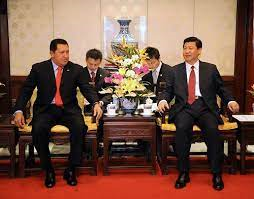
In 2009, Chinese Vice President Xi Jinping met with Venezuelan President Chavez
Chavez's governance
The rise in oil prices that began in the early 2000s brought Venezuelan funding from unprecedented amounts since the 1980s. In order to maintain political power, Chavez implemented a social plan and initiated the "Bolivar Mission" to provide public services to improve economic, cultural and social conditions. Although the aid program is accused of benefiting some poor people, Chavez and his allies and partners have benefited more than others. Bolivar’s mission is to build thousands of free clinics serving the poor and to promote food and housing subsidies. An OAS report in 2010 mentioned achievements in eliminating illiteracy, improving medical care and alleviating poverty, as well as progress made at the economic and social levels. A United Nations indicator also shows that the lives of the Venezuelan people have improved. The lower classes of Venezuela who have benefited from the policy are considered important to Chavez’s support.
The social project initiated by the Chavez government relies on oil revenue support, but high oil prices have also brought "Dutch disease" to the Venezuelan economy. By the time Chavez died of illness, the excessive spending and price controls during his tenure were obviously difficult to sustain for a long time. The Venezuelan economy began to be unstable, and the problems of poverty, inflation and shortage of supplies began to worsen. By 2015, even if Chavez continues to serve as president instead of Maduro, the economic problems faced by Venezuela at the time will also appear. Soon after Chavez died of illness in March 2013, "Foreign Policy" made it clear that no matter who inherited Chavez, he would take over one of the most ineffective economies in the Americas.
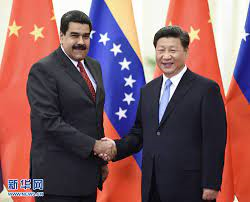
In 2015, Chinese President Xi Jinping met with Venezuelan President Maduro
Maduro's governance
Most of the economic policies at the time of Chavez's death were continued by Maduro, who succeeded him. When Maduro took over as president, Venezuela had to face the high inflation caused by Chavez’s policies and the shortage of many goods.
By 2014, Venezuela had fallen into an economic recession. By 2016, Venezuela’s inflation rate was as high as 800%, the highest ever in the country at that time. The International Monetary Fund had predicted in January 2018 that Venezuela’s inflation rate in 2018 would be as high as 13,000%, but in July of the same year it estimated that the inflation rate could reach 1,000,000% by the end of 2018. The International Monetary Fund predicts that Venezuela’s inflation rate in 2019 will reach 10 million%.
financial crisis
In 2014, oil prices fell back from a high level, and the Venezuelan government did not adjust policies to respond to low oil prices. As of early 2016, the official price of gasoline retailed by the state was still less than US$0.01 per gallon, and the official exchange rate against the US dollar was 150 times different from the black market price.
In addition, the International Monetary Fund predicts that Venezuela's economy will shrink by 18% in 2018.
Shrinking production
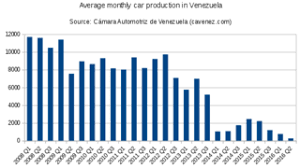
Venezuela’s net oil exports have been rising for a long time before Chavez came to power, but they have fallen more and less after he came to power.
After the Venezuelan government nationalized oil companies, due to poor management and insufficient investment in equipment, oil production began to decline. In 2017, Venezuelan oil production hit a 25-year low, and the state-owned Venezuelan oil company even needed to import liquefied petroleum gas to meet domestic demand. need. At the same time, the oil workers who maintain the biggest pillar of Venezuela's economy also had many people who lacked enough energy to cope with their work in 2017 because of chronic food shortages. Many oil workers either fell ill or quit their jobs, further hitting the country's oil industry. In the face of a wave of worker resignations, oil companies set a daily maximum number of resignations to slow down the loss of workers. Workers will lose their pensions if they "leave without saying goodbye".
In May 2018, Venezuela’s daily average crude oil production fell to 1.39 million barrels.
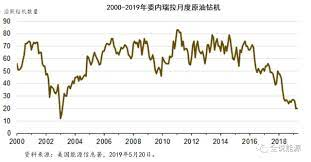
Changes in Venezuela's oil production from 2000 to 2018
In the era of high oil prices, the Venezuelan government imported a large amount of goods and then sold them to the people at low prices. This caused the country's industry to become unprofitable and began to shrink. Later price controls further hit the country's industrial production. After the decline in oil prices, Venezuela’s imports fell sharply, but at this time local production was no longer able to fill the gap caused by the reduction in imports. Various government controls out of reality have caused businesses to simply stop production, worsening the shortage of supplies, and causing more problems. Many people are unemployed.
debt
According to the Central Bank of Venezuela, the country ’s national debt in 2014 can be divided into:
• Public debt: 55% of the total , including local and external bonds, treasury bills and bank loans.
• The financial liabilities of Venezuelan oil companies accounted for 21% of the total .
• External debt, which accounts for 15% of the total .
• CADIVI ’s debt accounts for 9% of the total .
2017 Nian 11 months, the "Economist" estimates Venezuelan debt amounted to 1,050 billion US dollars, while its reserves of only 100 billion dollars.
Shortage of supplies
The price controls and other measures implemented by Chavez have caused a shortage of supplies in Venezuela. During Maduro's tenure, the government tightened foreign exchange controls on importers, causing the shortage of supplies to worsen.
Not only is there a shortage of controlled food, but also basic necessities, personal hygiene products and even medicines. With the continued shortage of food, Venezuelans pick wild fruits and even go to the garbage dump to find something to eat to satisfy their hunger.
inflation
According to 2018 Nian 7 latest monthly economic data released by Venezuela's National People's Congress, Venezuela ended 2018 Nian 6 past month 12 inflation rate month reached 46,305% .
In September 2018 , the Venezuelan National Trade and Services Commission announced that after the Maduro government recently raised the minimum wage by 35 times, about 40 % of Venezuelan stores have chosen to close their doors.
Social crisis
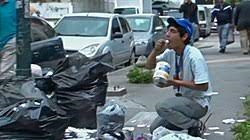
Venezuelans foraging from garbage dumps
After Venezuela fell into hunger, trucks carrying food needed armed guards to avoid attacks. The shops where food is still sold also need soldiers to garrison to stop the hungry people from looting.
" New York Times " reporter sent to investigate in 2017 in Venezuela, covering the country's 17 states 21 public hospitals, the doctor told investigators that the hospital's emergency room packed with serious weight malnourished children, in this situation of economic crisis Before they started, they rarely met and stated that "hundreds of people have died". Faced with the spread of hunger, the Venezuelan government responded with an obscure or postponed release of health statistics, and tried every means to prevent doctors from recording hospital admissions or deaths that might be reminiscent of improper government policies.
A poll released in September 2018 by the Venezuelan polling agency Meganalisis showed that 30.5% of Venezuelan respondents said that they often only eat one meal a day. 28.5% of the interviewees said that they "have nothing or almost nothing" to eat at least one day a week. 78.6% said they had difficulty finding enough food. 84.3% of people said that if "multi-country intervention" can bring a lot of food and medicine, they will support it.
The rise in violent crimes, especially murders, has been accused of “perhaps” Venezuelans’ “most concern” in this crisis. It is reported that Venezuela had 27,875 murders in 2015, which is 90 per 100,000 people, which is much higher than the 5 per 100,000 people in the United States. "The New Yorker" stated that Venezuela has the highest rate of violent crimes in the world, with less than 2% of reported crimes being prosecuted. A reporter from The New Yorker said that even in a public hospital in Valencia, it is not safe. Robbers go there to attack employees and patients. Although there are many police and militias there, the job of those people is not to defend the hospital. , But to prevent journalists from interviewing the hospital facts that the government does not want them to report. It is reported that the police even colluded with the robbers and shared part of the stolen goods.
Population exodus
Since Chavez became president, 4 million Venezuelans have left their country to live abroad until the beginning of 2018. The Wall Street Journal stated that many Venezuelan white-collar workers chose to flee abroad because of the high crime rate, high inflation, and the unabated state-owned socialist control. It is also estimated that more than 1.5 million people emigrated from Venezuela between 1999 and 2014.
In 1998, when Chavez was elected president for the first time, only 14 Venezuelans were granted asylum by the United States. However, as of September 30, 2005, the number of asylum granted by the United States during the year had risen to more than 1,000. The rhetoric of Chavez who advocated redistributing wealth to the poor caused worries among the wealthy and even the middle class, and promoted the first wave of immigration. US diplomats in Venezuela pointed out in a message to their country in 2002 that "the outflow of skilled labor can have a serious impact on Venezuela's future."
Scholars and business leaders stated that Venezuela’s population exodus has increased significantly during the last few years of Chavez’s tenure and especially during Maduro’s tenure. In the second wave of immigration, many low-class people who were affected by the economic crisis joined the group. They were the people Chavez tried to help, but they also chose to go abroad because they were dissatisfied with the domestic situation. In 2016, more than 150,000 immigrants went abroad, which is a new high in more than 10 years. In 2017, the number of immigrants going abroad doubled to "hundreds of thousands".
The Venezuelan immigration crisis became more obvious in 2018. The UNHCR issued new guidelines to governments on March 13, 2018, encouraging governments to protect Venezuelans entering their borders.
Medical breakdown
During Maduro's tenure, the Venezuelan government has been unable to provide medical workers with sufficient funds to purchase the medical supplies needed. Private doctors have reported that there are countless patients suffering from easily treatable illnesses, but because of the economic downturn that began in 2014, they have to wait to die. Facing the collapse of the country's medical system, the number of Venezuelans seeking medical care in the emergency department of neighboring Colombia has risen sharply.
Venezuela declared malaria extinct in the country as early as 1961. But by 2016, the country's malaria prevention plan had collapsed, with more than 100,000 cases occurring each year. The shortage of medicines has also caused thousands of HIV-infected people in the country to develop AIDS.
In 2016, infant mortality rose by 30.12%, with 11,466 deaths, maternal deaths by 65.79%, with 756 deaths, and malaria cases by 76.4% to 240,613.
The low salaries brought about by the economic crisis and the deterioration of public security have caused a large number of Venezuelan doctors to work in other countries. According to statistics from the Venezuelan Medical Union, 13,000 doctors have left Venezuela from 1999 until December 2016.
Sanctions crisis
The sanctions crisis came from the United States' long-term economic sanctions, which caused the overall domestic economy to continue to deteriorate. In order to get rid of poverty, the Venezuelan Energy Agreement (Petro Caribe) was used to build regional influence during the administration of the late former President Hugo Chavez. However, this move is regarded by the United States as endangering U.S. interests. Former U.S. President Barack Obama even presented a new list of sanctions against Venezuela by threatening the United States and violating human rights. Since 2017, the United States has imposed strong sanctions and announced a new round of sanctions against Venezuela. Sanctions against the sources of funds of the Maduro government. Measures include prohibiting the trading of bonds and stocks issued by the Venezuelan government or state oil companies.
Humanitarian assistance
Although the food shortage in Venezuela is getting worse, the Venezuelan government still refused to accept humanitarian assistance from other countries until 2018 .
Foreign policy advice
As Venezuela and China have very close political ideas, diplomatic and economic relations, before the current showdown in Venezuela, it is recommended that China's foreign policy maintain contact with Venezuela and maintain world peace as the supreme purpose of maintaining world peace in order to seize the initiative in the future.
